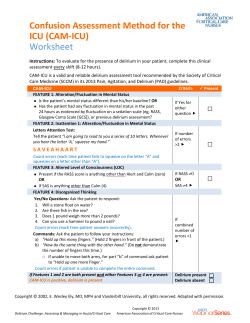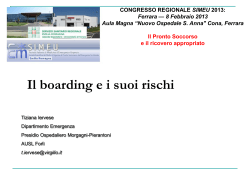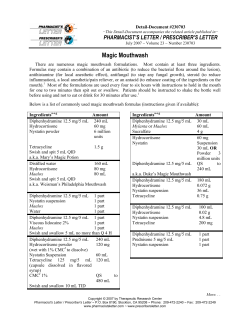
Diphenhydramine Overdose Related Delirium: A Case Report M -P H
Delirium and diphenhydramine overdose 77 Diphenhydramine Overdose Related Delirium: A Case Report MIN-PO HO, KUANG-CHAU TSAI, CHANG-MING LIU Diphenhydramine (DPHM) overdose is one of the most common causes of acute poisoning encountered in the emergency department. DPHM possesses both anticholinergic and sedative effects. Many authors have reported that topical and oral doses have led to hallucinatory psychosis, delirium, widecomplex tachycardia, hyperthermia, seizures and rhabdomyalysis, and the well-known anticholinergic syndrome has been well documented. We report on a young female patient who presented with delirium after ingesting 24 pills (one pill contains 50 mg) of DPHM to attempt suicide. Although the patient was treated with early gastric emptying followed by activated charcoal and general supportive care, she developed mental confusion, disorientation and short-term memory loss three hours after ingestion of DPHM. These symptoms subsided about seven hours after ingestion without neuropsychiatric sequalae. Key words: antihistamine, diphenhydramine (DPHM), delirium, overdose Introduction Case Report Diphenhydramine (DPHM) is one of many A previously healthy young woman was sent antihistamine agents and is a common component to our emergency department (ED) after ingesting in many over-the-counter medications for allergies, the common cold and as a sleeping aid. The 24 tablets of DPHM to attempt suicide. Details of the patient’s drug ingestion history were obtained USA’s Food and Drug Administration (FDA) ap- from her mother, who brought in four empty cards proved DPHM for use as a nonprescription antihistamine and hypnotic in doses up to 50 mg (1). of DPHM that were found at the patient’s bedside. Ingestion of the drug was confirmed by the patient Some authors have reported life-threatening prob- herself. She denied any history of psychiatric (2-11) . Tejera reported a lems with DPHM overdose case of delirium in an elderly patient that was disorders, any underlying medical problems or previous trauma. The patient had taken 24 tablets associated with a high blood level of the anticho- of DPHM after an argument with her family, (10) linergic drug . Sexton described a case of DPHMinduced psychosis after therapeutic doses (11). We without coingestion of other drugs or alcohol. On presentation, her vital signs and physical report on a young woman who had delirium after examination were unremarkable except for slight ingesting 24 pills (one pill contains 50 mg) of DPHM to attempt suicide. We also discuss DPHM, anxiety, mild fever, tachycardia and mildly dilated, reactive pupils bilaterally. Complete blood count, its adverse effects and overdose management. electrolyte levels, liver function test and renal Received: January 6, 2006 Accepted for publication: March 17, 2006 From Department of Emergency Medicine, Far Eastern Memorial Hospital Address for reprints: Dr. Min-Po Ho, 21 Nan-Ya South Road, Section 2, Pan-Chiao 220, Taipei, Taiwan, R.O.C. Department of Emergency Medicine Far Eastern Memorial Hospital Tel: (02) 89667000 ext 4161 Fax: (02) 22601954 E-mail: hominpo@yahoo.com.tw 78 J Emerg Crit Care Med. Vol. 17, No. 2, 2006 function test were within reference ranges. Pulse oximetry showed oxygen saturation of 98% at cause dilated pupils, CNS stimulation, tremor, hallucination, seizures and hyperpyrexia(1-10,15). Top- room air status. The patient received early gastric ical and oral doses have led to hallucinatory emptying followed by activated charcoal and general supportive care. During observation in the psychosis, delirium, wide-complex tachycardia, hyperthermia, seizures and rhabdomyalysis, and ED, she appeared anxious, mentally confused, the well-known anticholinergic syndrome has been disoriented in place and time and had short-term memory loss three hours after ingestion of the well documented (4-10). Early gastric emptying followed by activated charcoal may have contributed DPHM. She had forgotten about events that had to our patient’s survival(1). occurred a few hours earlier. The patient’s mother told her that she had been wandering around other Clinical features of DPHM overdose depend on the patient’s age. Children and young adults patients’ beds and talking to other patients using quite commonly present with fixed, dilated pupils inappropriate language. The patient was awake but presented with mental confusion, disorientation and CNS stimulation including excitement, tremors, hyperactivity, hallucinations, hyperpyrexia and tonic and reduced clarity of awareness of her environment. clonic seizures. Adults usually present with CNS These symptoms gradually improved about seven hours after ingestion of the DPHM. We collected depression leading to coma, and only rarely suffer from seizures(2). Some authors have reported death the patient’s urine for toxin screening and it tested from massive overdoses of DPHM (1,2,15). Although positive for DPHM. We gave a detailed explanation to the patient of the adverse effects of taking our patient received early gastric emptying followed by activated charcoal, she developed mental the drug and suggested close observation whilst confusion, disorientation and memory loss three she remained in the ED. After consulting with a psychiatrist, it was hours after ingestion of DPHM. Rapid absorption and tissue distribution may be responsible for such suggested that the patient remain under close early presentation of symptoms following a DPHM observation and be admitted for further psychiatric evaluation. However, the patient was discharged overdose(1). Besides its well-known anticholinergic activity, an increase in dopaminergic brain activity 12 hours after arrival at our ED, against our is proposed as the causal mechanism for halluci- advice. She was followed up 12 days later and reported no further psychiatric or amnestic nations (12). Another factor contributing to delirium in our case may be the anticholinergic effects of symptoms. DPHM and its ability to cross the blood-brain Discussion barrier, making the clinical effects of a DPHM overdose different from nonsedating, second-generation H1-receptor antagonists(12). Antihistamines of the ethanolamine class, such as DPHM, are potent histamine antagonists noted We observed that our patient recovered about seven hours after ingestion of the drug. At that for sedative and anticholinergic properties. Many time, she was able to follow simple commands people use DPHM as a sleeping aid, and it is also taken when attempting suicide (1) . It is a first- and communicate well. For several decades, DPHM has been known to cause various medical and generation H1-antagonist and still one of the most psychiatric adverse effects (11) . Both drowsiness frequently used antihistamines for allergies, the common cold and as a sleeping aid. Overdose may and impairment of some types of mental performance have developed after a single 50 mg oral Delirium and diphenhydramine overdose 79 dose(14). The adverse effects depend on the dose; more than 1.0 gm oral dose results in severe 5. E m a d i a n S M , C a r a v a t i E M , H e r r R D . Rhabdomyalysis: A rare adverse effect of diphen- symptoms in patients without risks factors (13) . hydramine overdose. Am J Emerg Med 1996; Therefore, the patient who develops severe symptoms should be hospitalized. A 27-year-old female 14:574-6. 6. Christensen RC. Misdiagnosis of anticholin- patient developed anticholinergic syndrome after ergic delirium as schizophrenic psychosis. Am DPHM poisoning and recovered after administration of 2 mg physostigmine within 12 hours(4). J Emerg Med 1995;13:117-8. 7. Olson KR, Kearney TE, Dyer JE, Benowitz In agreement with previous authors, our case NL, Blanc PD. Seizures associated with poi- presented with mental confusion, disorientation and memory loss after ingestion of 24 tablets of soning and drug overdose. Am J Emerg Med 1994;12:392-5. DPHM (total dose over 1.0 gm) and so required 8. Clark RF, Vance MV. Massive diphenhydramine hospitalization. DPHM-induced delirium or psychosis may occur after a therapeutic dose or poisoning resulting in a wide-complex tachycardia: successful treatment with sodium overdose, especially in elderly patients(6,10,11,14). bicarbonate. Ann Emerg Med 1992;21:318-21. We suggest that emergency physicians keep in mind the differential diagnosis of acute deliri- 9. Bernhardt DT. Topical diphehydramine toxicity. Wis Med J 1991;90:469-71. um or psychosis, especially for elderly patients 10. Tejera CA, Saravay SM, Goldman E, Gluck L. taking over-the-counter medications at the time of presentation. Management of DPHM overdose com- Diphenhydramine-induced delirium in elderly hospitalized patients with mild dementia. Psy- prises of early gastric emptying followed by acti- chosomatics 1994;35:399-402. vated charcoal and general supportive care. References 11. Sexton JD, Pronchik JD. Diphenhydramineinduced psychosis with therapeutic doses. Am J Emerg Med 1997;15:548-9. 1. Rinder CS, D’Amato SL, Rinder HM, Cox 12. Paya B, Guisado JA, Vaz FJ,Crespo-Facorro B. Visual hallucinations induced by the com- PM. Survival in complicated diphenhy- bination of prolinatane and diphenhydramine. dramine overdose. Crit Care Med 1988;16: 1161-2. Pharmacopsychiatry 2002;35:24-5. 13. Radovanovic D, Meier PJ, Guirguis M, Lorent 2. Krenzelok EP, Anderson GM, Mirick M. Mas- JP, Kupferschmidt H. Dose-dependent toxicity sive diphenhydramine overdose resulting in death. Ann Emerg Med 1982;11:212-3. of diphenhydramine overdose. Human and Experimental Toxicology 2000;19:489-95. 3. Jones J, Dougherty J, Canon L. Diphenhy- 14. Gengo F, Gabos C, Miller JK. The pharmaco- dramine-induced toxic psychosis. Am J Emerg Med 1986;4:369-71. dynamics of diphenhydramine-induced drowsiness and changes in mental performance. Clin 4. Lang K, Sigusch H, Muller S. An anticholinergic syndrome with hallucination psychosis after diphenhydramine poisoning. Deutsche Medizinische Wochenschrift 1995;120:1695-8. Pharmacol ther 1989;45:15-21. 15. Hausmann E, Wewer H, Wellhoner HH, Weller JP. Lethal intoxication with diphenhydramine. Arch Toxicol 1983;53:33-9. 80 J Emerg Crit Care Med. Vol. 17, No. 2, 2006 !"#$%&'()*+, !"#$!%&' !"#$%&'(diphenhydramine) (anticholinergic) !"#$%&'()*&+ !,-./01234 !"#$%&'()*#+,-./01%234!56789:#234;5 !"#$%#&!#'()*+,#-./#01#234567#89:;<7=>?7@A !"#$%&'()*+,-./012345(diphenhydramine) !"#$%&'()*+,-./012(345674829:;/<=>?@4A !"#$%&'()*+,-./01234*56789:; !"#$ ! !"#$%&(diphenhydramine, DPHM) 9516 !"#$95317 !"#$%"&' !"#$%&'()220 !"#$%$&'(21 (02)896670004161 !(02)22601954 E-mail: hominpo@yahoo.com.tw !" !"#$%&'$() !"#$%&'()*+ !BC <=>"##?*(@A
© Copyright 2025





















